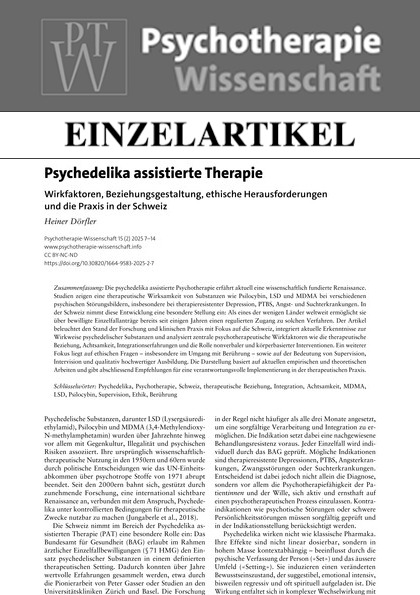Psychedelika assistierte Therapie
Wirkfaktoren, Beziehungsgestaltung, ethische Herausforderungen und die Praxis in der Schweiz
DOI:
https://doi.org/10.30820/1664-9583-2025-2-7Schlagworte:
Psychedelika, Psychotherapie, Schweiz, therapeutische Beziehung, Integration, Achtsamkeit, MDMA, LSD, Psilocybin, Supervision, Ethik, BerührungAbstract
Die psychedelika assistierte Psychotherapie erfährt aktuell eine wissenschaftlich fundierte Renaissance. Studien zeigen eine therapeutische Wirksamkeit von Substanzen wie Psilocybin, LSD und MDMA bei verschiedenen psychischen Störungsbildern, insbesondere bei therapieresistenter Depression, PTBS, Angstund Suchterkrankungen. In der Schweiz nimmt diese Entwicklung eine besondere Stellung ein: Als eines der wenigen Länder weltweit ermöglicht sie über bewilligte Einzelfallanträge bereits seit einigen Jahren einen regulierten Zugang zu solchen Verfahren. Der Artikel beleuchtet den Stand der Forschung und klinischen Praxis mit Fokus auf die Schweiz, integriert aktuelle Erkenntnisse zur Wirkweise psychedelischer Substanzen und analysiert zentrale psychotherapeutische Wirkfaktoren wie die therapeutische Beziehung, Achtsamkeit, Integrationserfahrungen und die Rolle nonverbaler und körperbasierter Interventionen. Ein weiterer Fokus liegt auf ethischen Fragen – insbesondere im Umgang mit Berührung – sowie auf der Bedeutung von Supervision, Intervision und qualitativ hochwertiger Ausbildung. Die Darstellung basiert auf aktuellen empirischen und theoretischen Arbeiten und gibt abschliessend Empfehlungen für eine verantwortungsvolle Implementierung in der therapeutischen Praxis.
Veröffentlicht
Zitationsvorschlag
Ausgabe
Rubrik
Lizenz
Copyright (c) 2025 Heiner Dörfler

Dieses Werk steht unter einer Creative Commons Namensnennung - Nicht-kommerziell - Keine Bearbeitung 3.0 International -Lizenz.
Diese Zeitschrift bietet freien Zugang (Open Access) zu ihren Inhalten, entsprechend der Grundannahme, dass die freie öffentliche Verfügbarkeit von Forschung einem weltweiten Wissensaustausch zugutekommt.
Autor:innen, die in dieser Zeitschrift publizieren möchten, stimmen den folgenden Bedingungen zu:
- Die Autor:innen behalten das Copyright und erlauben der Zeitschrift die Erstveröffentlichung unter einer Creative Commons Namensnennung Lizenz, die es anderen erlaubt, die Arbeit unter Nennung der Autor:innenschaft und der Erstpublikation in dieser Zeitschrift zu verwenden (gemäß der Creative Commons Attribution-NonCommercial-NoDerivs 3.0 DE-Lizenz).
Die Autor:innen können zusätzliche Verträge für die nicht-exklusive Verbreitung der in der Zeitschrift veröffentlichten Version ihrer Arbeit unter Nennung der Erstpublikation in dieser Zeitschrift eingehen (z.B. sie in Sammelpublikation oder einem Buch veröffentlichen).


